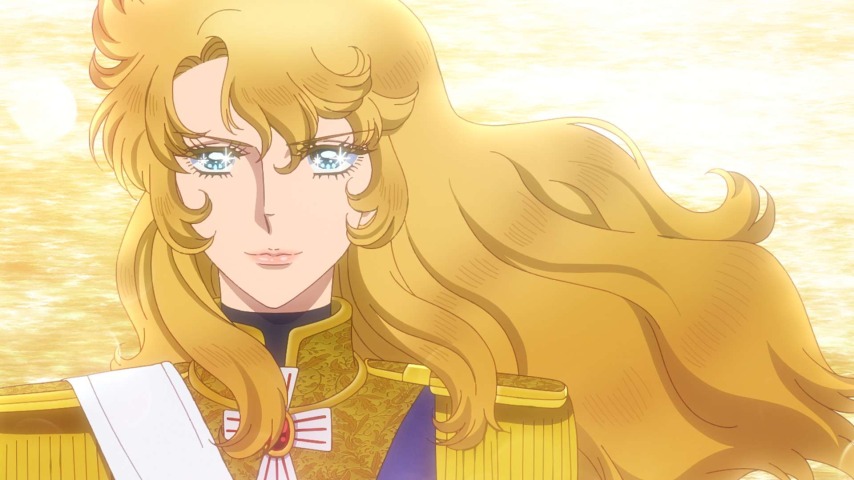Decades before Sailor Moon and Revolutionary Girl Utena, The Rose Of Versailles changed female-focused manga by telling the story of the French Revolution through the eyes of two women: The very real Queen Marie Antoinette, who lost her reputation then her head, and the fictional royal guard Oscar François de Jarjayes, who was raised in a male role since birth. Riyoko Ikeda brought her student-protest-influenced New Left politics to the shifting trajectories of these two intersecting elites. She also brought a complex feminism to the sweeping romances embedded inside this historical epic, which signaled a dramatic shift in the shōjo world. More than 50 years since the series came to a close—and nearly 50 years since the French New Wave’s versatile Jacques Demy gave it a live-action film adaptation—filmmaker Ai Yoshimura and studio MAPPA condense the florid tale into a two-hour anime feature that saps some depth from its characters but loses little of its larger appeal.
Though dealing with different historical periods, the film’s plotty songs and heightened revolutionary French setting evoke an anime Les Misérables, its theatrical idealism marching towards tragedy. But rather than traversing grim prisons, alleys, sewers and taverns, The Rose Of Versailles immerses viewers in the entitled emptiness of the upper crust, embodied by the naïve Marie Antoinette (Aya Hirano) and the baroque background art that’s stylized as any manga cover. Behind palace walls, the film adapts the most popular portion of the decades-spanning story, from Marie Antoinette’s arrival in France to the climactic storming of the Bastille.
The Rose Of Versailles squeezes much of its early plot into a series of vignettes, only later allowing its chapters to flourish on a more grand military scale. This means Marie Antoinette comes off rather thin and vacuous compared to the level-headed and increasingly radicalized Oscar (Miyuki Sawashiro). Rather than becoming fully-fleshed foils with their own complicated relationship, as the story sets up—both along class lines and in the love triangle formed between Oscar, Marie Antoinette, and Swedish royal Hans (Kazuki Kato)—an increasingly isolated Marie Antoinette fades into the background in favor of the far more compelling figure of Oscar.
The crossdressing, androgynous heroine, whose internal struggle around binary gender roles still feels fresh, grounds the broad emotions and classic, over-the-top aesthetic permeating the film. As she gets closer to the common people’s cause, she begins understanding her romantic feelings towards her equally androgynous childhood friend/vassal André (Toshiyuki Toyonaga). It’s a well-balanced wrestle with identity, paralleling gender expression and class solidarity through personal choice and tangible sacrifice. Even amid the flowing hair, open white shirts, easy tears, and flowery frames—even during the elliptical musical numbers, which can feel like recurring opening credit montages as rococo as the literally starry-eyed protagonists—Oscar’s moral backbone and sense of self pushes through the fluff. Miyuki Sawashiro’s performance guides it throughout, hitting both husky determination and raw emotion honestly.
And The Rose Of Versailles is in dire need of a strong throughline because, in order to fit so much material in, sequences that would otherwise seem like important side stories or character moments become non-narrative music video fodder, as confusing as vintage karaoke B-roll. This formal tendency to gloss over character beats goes hand-in-hand with its sometimes ridiculous romance-fiction dialogue. One character, describing her new love as a “storm of yearning that struck my heart like lightning in a storm,” offers one of the movie’s worst examples.
A certain broadness is expected in a teen-aimed, heart-on-sleeve story, but Versailles embraces its overwrought tendencies so boldly that it’s nearly respectable. Interludes burst from the screen, while moments of extreme sentiment cause the film to transcend reality into a dreamlike plane. But The Rose Of Versailles also offers plenty of seasoning to overcome its more treacly elements. Art from in and around the revolution—ranging from anime-styled versions of Romantic portraits to political cartoons mocking Marie Antoinette to a fascination with Roman iconography—adds diversity to the otherwise garish visuals, as does the striking violence during the excitingly staged battle sequences.
These conflicts, and the optimistic politics behind them, solidifies The Rose Of Versailles as a potent period piece as well as a grand romance. Though its characters lack the kind of long-gestating tensions often spread across dozens of comic chapters or TV episodes, they’re still satisfying figureheads for an intimate interpersonal story told within the boundaries of a burgeoning revolution. This simplified version of the story serves as an inviting way for newcomers to experience a revolutionary series.
Director: Ai Yoshimura
Writer: Tomoko Konparu
Starring: Miyuki Sawashiro, Aya Hirano, Toshiyuki Toyonaga, Kazuki Kato
Release Date: April 30, 2025 (Netflix)









































